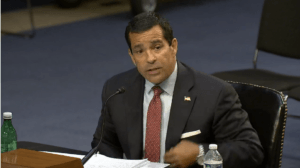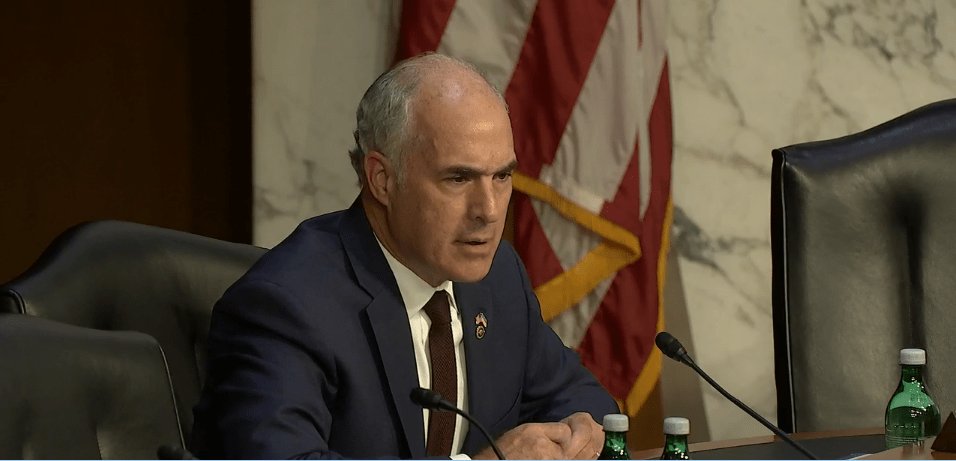One of the biggest, if not surprising, takeaways from Wednesday’s Senate Intelligence Committee hearing came from Sen. Bob Casey (D-PA). While everyone in the room was focused on adversaries spying on the private sector, and influence operations in academia and elsewhere, Senator Casey asked the four panelists – shouldn’t the U.S. government be monitoring what American multinationals are investing in overseas?
“Could the National Counterintelligence and Security Center (NCSC) or the intelligence community more broadly help educate the private sector to the risk of outbound investment, especially when it comes to China,” Sen. Casey asked, adding that an assessment of U.S. capital investments into early-stage technology development in China needed oversight.
One of the witnesses, former NCSC director William Evanina, said “yes” on oversight. If such a move occurred, it would give The Committee on Foreign Investment in the United States (CFIUS) — an inter-agency committee of the United States government that reviews national security implications of foreign investments into the U.S., a whole new set of things to look at: U.S. multinationals putting money to work in China biotech, semiconductors, and other manufacturing industries.

Former NCSC director William Evanina was one of four witnesses at a Senate Intelligence Committee hearing, seen here, on September 21, 2022.
Evanina said CFIUS would be the model for that. “I do believe there is success currently with the way it is done on CFIUS, with the way the intelligence community partners with Commerce and Treasury and others, regarding U.S. investments. You reverse that by saying the same type of vulnerability and threats to national security occur outbound. Certainly (we) could advise a (corporate) investor on the perils of investing overseas.”
Wednesday’s Senate Intelligence Committee hearing, titled Protecting American Innovation: Industry, Academia, and the National Counterintelligence and Security Center, was based largely on a 138-page NCSC report assessing U.S. counter-intelligence capabilities.
Most of the hearing was about countering China influence operations and private sector spying. It was largely a plea by former officials in the intelligence community – known as the IC in Senate parlance – for more government funds. Overall, though, the message was clear – spycraft has changed to influence peddling and private intelligence gathering and cyber-attacks that are different from the olden days of CIA and KGB cloak and dagger style intelligence gathering.
Evanina said “the battle space is in the private sector and it is mostly China. It’s not government to government.”
Senator Michael Bennet (D-CO) said that nothing the U.S. government was ever told about China turned out to be true. He was pointing out the call back in the early days of China’s opening up that once it traded with the world – and, later, gained access to internet technology – China would become one giant Japan.
“It turns out nothing we said about China turns out to be real. China exports its (technocratic, authoritarian) model as a result of internet technology and technology more generally. What would it look like if we actually got our act together and treated it as seriously as we needed to?” Sen. Bennet said.
One sticky question was whether Washington needed to bring counter-intelligence agents into the private sector, which meant a wider scope for official spies and intel analysts getting inside corporate America supply chains.
Evanina supported this idea. Chairman Mark Warner (D-VA) panned it almost immediately. “We don’t want the IC looking at domestic companies,” he said.
This summer, Sen. Casey introduced a bill with other Senators to legislate an outbound investment mechanism through CFIUS.
That legislation, called the National Critical Capabilities Defense Act, or what some have dubbed the “reverse CFIUS”, calls for developing a targeted outbound investment mechanism “to ensure the United States is not ceding its manufacturing power in industries critical to our economic and national security to foreign adversaries.”
CPA supports legislation that would crack down on outbound investment and are calling for its inclusion in an end-of-year spending bill.
Casey said they have not succeeded in getting it into other bills, most recently the Bipartisan Innovation Act. The bill in its current form is opposed by the U.S. Chamber of Commerce.
Data collection and academia were also an issue raised by the Senate Intelligence Committee. This included U.S. research partnerships with Chinese universities, as well as Chinese scientists working at U.S. research institutions.
Recently, business intelligence firm Strider released a report called the Los Alamos Club which notes that between 1987 and 2021, at least 162 scientists that worked at the Los Alamos National Laboratory returned to China to support a variety of domestic research and development programs. Fifteen of those scientists worked as permanent staff members at Los Alamos. Of those fifteen, thirteen were recruited into China government talent programs; some were responsible for sponsoring visiting scholars and postdoctoral researchers from China, and some received U.S. government funding for sensitive research. At least one of these staff members held a U.S. Department of Energy “Q Clearance” which means you get access to top secret files and have a national security clearance.
“The level of awareness in academia has definitely heightened over where it was five years ago, but that’s not good enough. We’ve got a long way to go,” said Kevin Gamache, Associate Vice Chancellor and Chief Research Security Officer at Texas A&M University and one of the four witnesses. “Our technological leadership is under siege from China. We can’t arrest our way out of this problem.”
Committee Chairman Warner said there is a disconnect between Wall Street, academia, and what he hears from government intelligence on China. “Night and day difference,” he said. “They have no idea about the (supply chain and investment) risks.”












